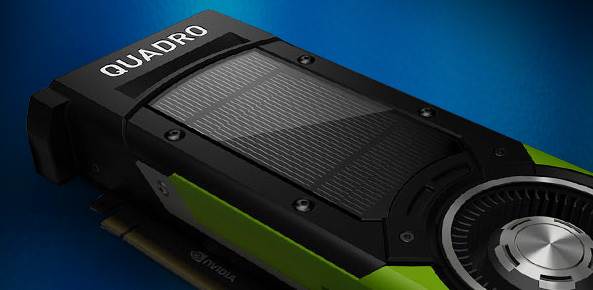Powerful is the name of the game for a new GPU introduced recently by Nvidia, the California-based tech company. But while the new Quadro P6000 could be used impressively in games, its real aim is to make workflow faster and more efficient for designers and scientists who work with in-depth visuals.
The new Nvidia Quadro P6000 graphics processing unit is built on Nvidia’s Pascal architecture and boasts top-of-the-line performance thanks to its 3,840 CUDA parallel-processing cores. It also boasts 24 GB of GDDR5X GPU memory that’s capable of putting out 12 teraflops of FP 32 performance. All that power, not surprisingly, uses a lot of power: The top rate of consumption for the P6000 is 250 watts, and to run it requires PCI Express 3.0 as well as 16 slots on the user’s PC mainboard.
Previously, the top-of-the-line GPU from Nvidia was the Titan X, released earlier this month. Titan X has 12GB of GDDR5X memory that’s clocked at 10Gbps, along with 3,584 CUDA cores — more than 1,000 more than what’s found inside the GeForce GTX 1080 graphics card, which was released barely two months ago.
Workflow Benefits
In endorsing the new Quadro P6000, Steve May, CTO at Pixar Animation Studios, pointed out that the studio’s artists are often working with 50GB or higher datasets.
“The ability to visualize scenes of this size interactively gives our artists the ability to make creative decisions more quickly,” stated May. “We’re looking forward to testing the limits of Pascal and expect the benefits to our workflows to be huge.”
For display output, the P6000 offers one DVI-D port, an optional stereo port and four DisplayPort 1.4 ports. At 10.5 inches by 4.4 inches, it seems made for sturdy desktop use only. Nvidia figures that the P6000 will be the go-to card in such areas as virtual-reality design and scientific visualization.
Smaller Sibling
Nvidia is showcasing both the P6000 and a smaller version, the Quadro P5000, at Siggraph 2016. The five-day computer graphics convention is taking place in Anaheim, Calif., this week.
The Quadro P5000 graphics card has 2,560 CUDA cores and 16 GB of GDDR5X memory. It’s capable of outputting up to 8.9 teraflops of FP 32 performance, and it requires less power than the P6000, calling for 180 watts of power but offering the same dimensions and video outputs as the P6000.
Nvidia is offering Siggraph attendees to check out the two new GPUs by experiencing a tech demonstration of the world’s first real-time 3D oil painting simulator from Adobe Research; watching a live demo of 4K videos being stitched in real-time with near imperceptible latency with Nvidia’s VRWorks 360 Video SDK and seeing Pixar content running on the new Nvidia DGX-1, fully ray-traced with Nvidia OptiX, at interactive speeds.
Nvidia has not released retail prices for the Quadro P6000 or P5000, suggesting that if you have to ask, you probably can’t afford one.







